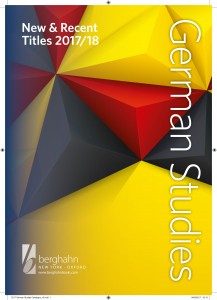 We are delighted to inform you that we will be attending the annual German Studies Association conference in Atlanta, Georgia, on October 5th-8th, 2017. Please stop by our stand to browse our latest selection of books at discounted prices & pick up some free journal samples.
We are delighted to inform you that we will be attending the annual German Studies Association conference in Atlanta, Georgia, on October 5th-8th, 2017. Please stop by our stand to browse our latest selection of books at discounted prices & pick up some free journal samples.
We are happy to invite you to join Berghahn on Friday October 6th at 5pm in the exhibit hall a rea for a wine reception to be held at Berghahn stand to celebrate the publication of EASTERN EUROPE UNMAPPED edited by Irene Kacandes and Yuliya Komskasome.
We are also excited to invite you to another wine reception Berghahn is hosting along with German Studies Association on Saturday, October 7th at 5pm, also at the Berghahn stand, to mark the publication of MODERN GERMANY IN TRANSATLANTIC PERSPECTIVE, edited by Michael Meng and Adam R. Seipp, in honor of Konrad H. Jarausch, a former GSA President and highly respected scholar in German Studies.
If you are unable to attend the conference, we would like to provide you with a special discount offer. Receive a 25% discount on all German Studies titles found on our website, valid through November 8th, 2017. At checkout, simply enter the discount code GSA17. Browse our new 2017-18 German Studies Catalog online or visit our website for a complete listing of all published and forthcoming titles.
Below is a preview of some of our newest releases on display:
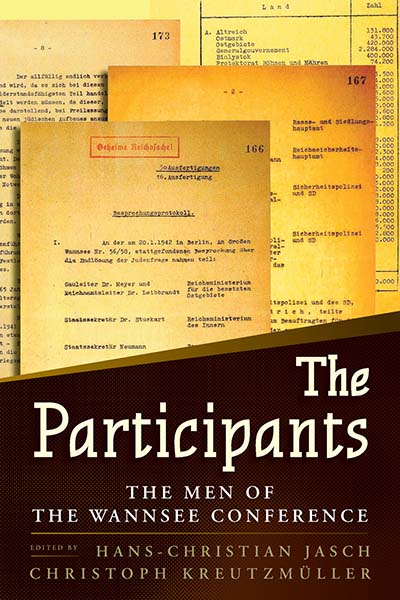 THE PARTICIPANTS
THE PARTICIPANTS
The Men of the Wannsee Conference
Edited by Hans-Christian Jasch and Christoph Kreutzmüller
Translated from the German by Charlotte Kreutzmüller-Hughes and Jane Paulick
On 20 January 1942, fifteen senior German government officials attended a short meeting in Berlin to discuss the deportation and murder of the Jews of Nazi-occupied Europe. Despite lasting only a few hours, the Wannsee Conference is today understood as a signal episode in the history of the Holocaust, exemplifying the labor division and bureaucratization that made the “Final Solution” possible. Yet while the conference itself has been exhaustively researched, many of its attendees remain relatively obscure. Combining accessible prose with scholarly rigor, The Participants presents fascinating profiles of the all-too-human men who implemented some of the most inhuman acts in history.
Read Introduction: The Participants: The Men of the Wannsee Conference
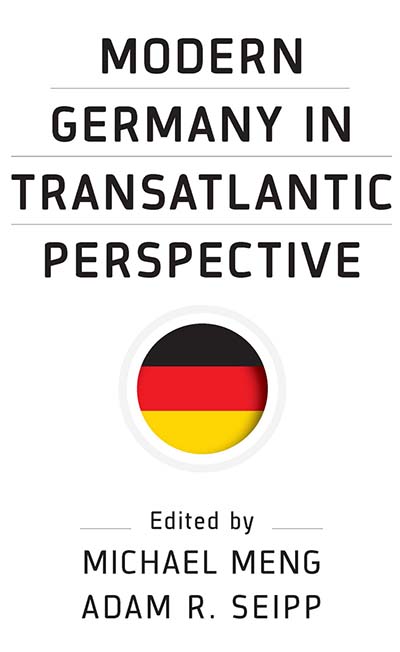 MODERN GERMANY IN TRANSATLANTIC PERSPECTIVE
MODERN GERMANY IN TRANSATLANTIC PERSPECTIVE
Edited by Michael Meng and Adam R. Seipp
Bringing together incisive contributions from an international group of colleagues and former students, Modern Germany in Transatlantic Perspective takes stock of the field of German history as exemplified by the extraordinary scholarly career of Konrad H. Jarausch. Through fascinating reflections on the discipline’s theoretical, professional, and methodological dimensions, it explores Jarausch’s monumental work as a teacher and a builder of scholarly institutions. In this way, it provides not merely a look back at the last fifty years of German history, but a path forward as new ideas and methods infuse the study of Germany’s past.
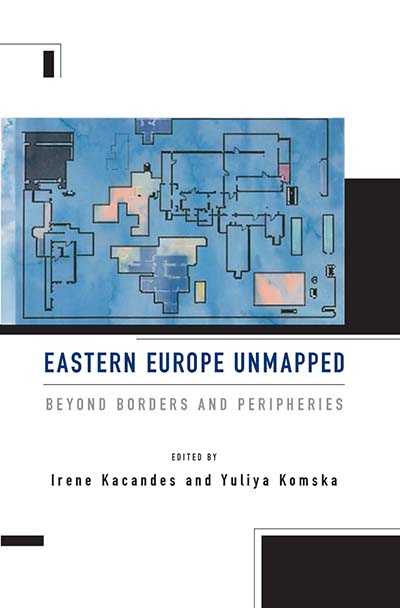 EASTERN EUROPE UNMAPPED
EASTERN EUROPE UNMAPPED
Beyond Borders and Peripheries
Edited by Irene Kacandes and Yuliya Komska
Arguably more than any other region, the area known as Eastern Europe has been defined by its location on the map. Yet its inhabitants, from statesmen to literati and from cultural-economic elites to the poorest emigrants, have consistently forged or fathomed links to distant lands, populations, and intellectual traditions. Through a series of inventive cultural and historical explorations, Eastern Europe Unmapped dispenses with scholars’ long-time preoccupation with national and regional borders, instead raising provocative questions about the area’s non-contiguous—and frequently global or extraterritorial—entanglements.
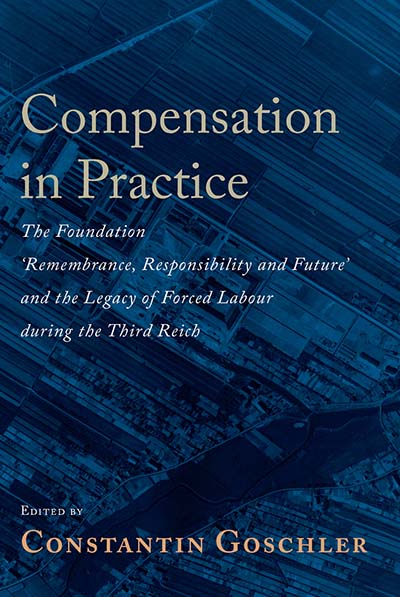 COMPENSATION IN PRACTICE
COMPENSATION IN PRACTICE
The Foundation ‘Remembrance, Responsibility and Future’ and the Legacy of Forced Labour during the Third Reich
Edited by Constantin Goschler
Founded in 2000, the German Foundation “Remembrance, Responsibility and Future” is one of the largest transitional justice initiatives in history: in cooperation with its international partner organizations, it has to date paid over 4 billion euros to nearly 1.7 million survivors of forced labour during the Nazi Era. This volume provides an unparalleled look at the Foundation’s creation, operations, and prospects after nearly two decades of existence, with valuable insights not just for historians but for a range of scholars, professionals, and others involved in human rights and reconciliation efforts.
Read Introduction
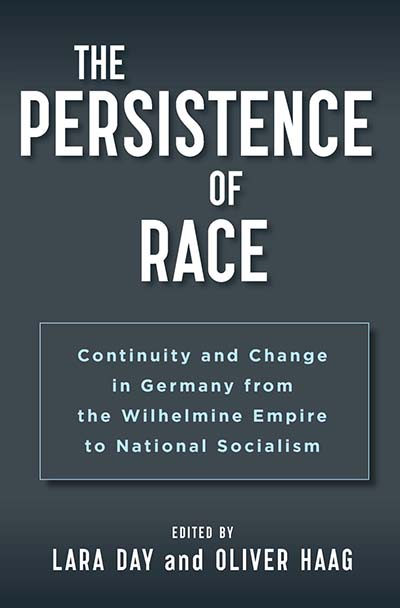 THE PERSISTENCE OF RACE
THE PERSISTENCE OF RACE
Continuity and Change in Germany from the Wilhelmine Empire to National Socialism
Edited by Lara Day and Oliver Haag
Race in 20th-century German history is an inescapable topic, one that has been defined overwhelmingly by the narratives of degeneracy that prefigured the Nuremberg Laws and death camps of the Third Reich. As the contributions to this innovative volume show, however, German society produced a much more complex variety of racial representations over the first part of the century. Here, historians explore the hateful depictions of the Nazi period alongside idealized images of African, Pacific and Australian indigenous peoples, demonstrating both the remarkable fixity race had as an object of fascination for German society as well as the conceptual plasticity it exhibited through several historical eras.
Read Introduction
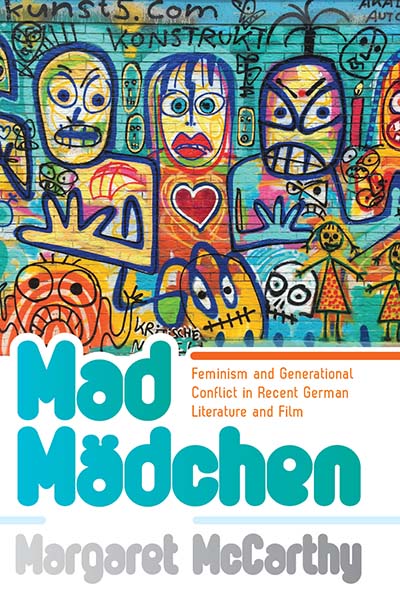 MAD MÄDCHEN
MAD MÄDCHEN
Feminism and Generational Conflict in Recent German Literature and Film
Margaret McCarthy
The last two decades have been transformational, often discordant ones for German feminism, as a new cohort of activists has come of age and challenged many of the movement’s strategic and philosophical orthodoxies. Mad Mädchen offers an incisive analysis of these trans-generational debates, identifying the mother-daughter themes and other tropes that have defined their representation in German literature, film, and media. Author Margaret McCarthy investigates female subjectivity as it processes political discourse to define itself through both differences and affinities among women. Ultimately, such a model suggests new ways of re-imagining feminist solidarity across generational, ethnic, and racial lines.
Read Introduction
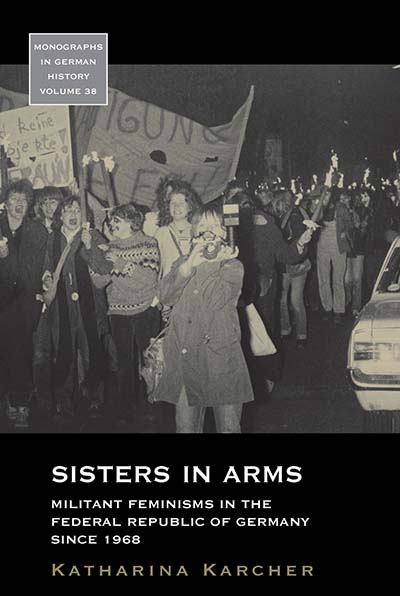 SISTERS IN ARMS
SISTERS IN ARMS
Militant Feminisms in the Federal Republic of Germany since 1968
Katharina Karcher
Volume 38, Monographs in German History
Few figures in modern German history are as central to the public memory of radical protest than Ulrike Meinhof, but she was only the most prominent of the countless German women—and militant male feminists—who supported and joined in revolutionary actions from the 1960s onward. Sisters in Arms gives a bracing account of how feminist ideas were enacted by West German leftist organizations from the infamous Red Army Faction to less well-known groups such as the Red Zora. It analyzes their confrontational and violent tactics in challenging the abortion ban, opposing violence against women, and campaigning for solidarity with Third World women workers. Though these groups often diverged ideologically and tactically, they all demonstrated the potency of militant feminism within postwar protest movements.
Read Introduction
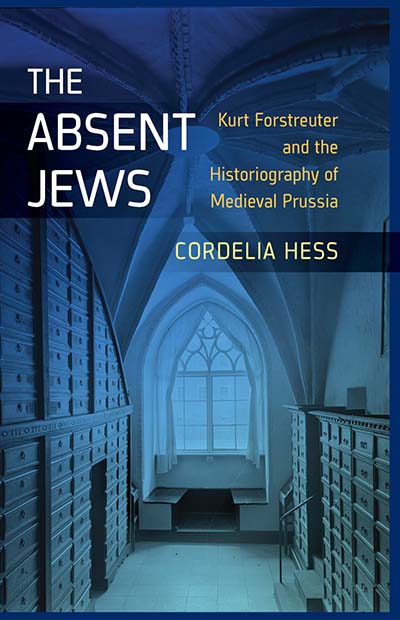 THE ABSENT JEWS
THE ABSENT JEWS
Kurt Forstreuter and the Historiography of Medieval Prussia
Cordelia Hess
For nearly a century, it has been a commonplace of Central European history that there were no Jews in medieval Prussia—the result, supposedly, of the ruling Teutonic Order’s attempts to create a purely Christian crusader’s state. In this groundbreaking historical investigation, however, medievalist Cordelia Hess demonstrates the very weak foundations upon which that assumption rests. In exacting detail, she traces this narrative to the work of a single, minor Nazi-era historian, revealing it to be ideologically compromised work that badly mishandles its evidence. By combining new medieval scholarship with a biographical and historiographical exploration grounded in the 20th century, The Absent Jews spans remote eras while offering a fascinating account of the construction of historical knowledge.
Read Introduction
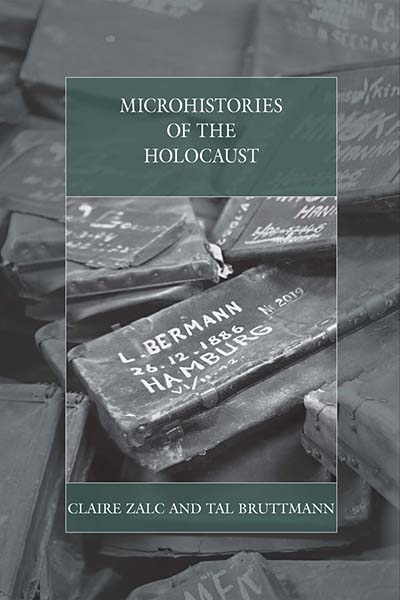 MICROHISTORIES OF THE HOLOCAUST
MICROHISTORIES OF THE HOLOCAUST
Edited by Claire Zalc and Tal Bruttmann
How does scale affect our understanding of the Holocaust? In the vastness of its implementation and the sheer amount of death and suffering it produced, the genocide of Europe’s Jews presents special challenges for historians, who have responded with work ranging in scope from the world-historical to the intimate. In particular, recent scholarship has demonstrated a willingness to study the Holocaust at scales as focused as a single neighborhood, family, or perpetrator. This volume brings together an international cast of scholars to reflect on the ongoing microhistorical turn in Holocaust studies, assessing its historiographical pitfalls as well as the distinctive opportunities it affords researchers.
Read Introduction: Towards a Microhistory of the Holocaust
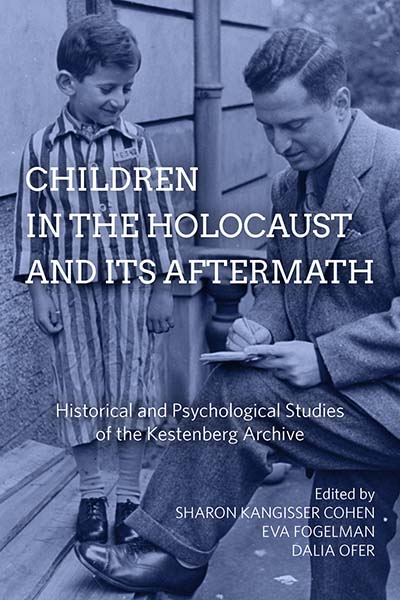 CHILDREN IN THE HOLOCAUST AND ITS AFTERMATH
CHILDREN IN THE HOLOCAUST AND ITS AFTERMATH
Historical and Psychological Studies of the Kestenberg Archive
Edited by Sharon Kangisser Cohen, Eva Fogelman, and Dalia Ofer
The testimonies of individuals who survived the Holocaust as children pose distinct emotional and intellectual challenges for researchers: as now-adult interviewees recall profound childhood experiences of suffering and persecution, they also invoke their own historical awareness and memories of their postwar lives, requiring readers to follow simultaneous, disparate narratives. This interdisciplinary volume brings together historians, psychologists, and other scholars to explore child survivors’ accounts. With a central focus on the Kestenberg Holocaust Child Survivor Archive’s over 1,500 testimonies, it not only enlarges our understanding of the Holocaust empirically but illuminates the methodological, theoretical, and institutional dimensions of this unique form of historical record.
Read Introduction
New German Historical Perspectives Series
Established in 1987 this special St. Antony’s series on New German Historical Perspectives showcases pioneering new work by leading German historians on a range of topics concerning the history of modern Germany and Europe. Publications address pressing problems of political, economic, social, and intellectual history informed by contemporary debates about German and European identity, providing fresh conceptual, international, and transnational interpretations of the recent past.
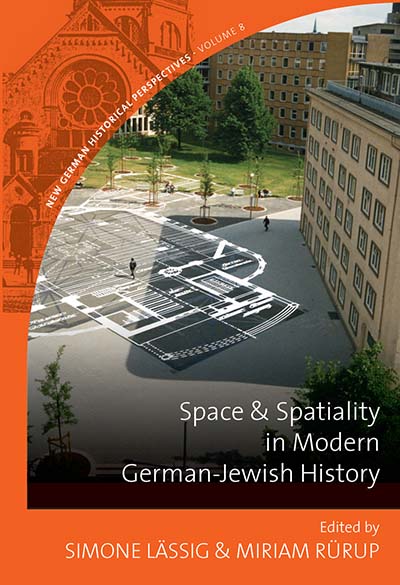 Volume 8
Volume 8
SPACE AND SPATIALITY IN MODERN GERMAN-JEWISH HISTORY
Edited by Simone Lässig and Miriam Rürup
What makes a space Jewish? This wide-ranging volume revisits literal as well as metaphorical spaces in modern German history to examine the ways in which Jewishness has been attributed to them both within and outside of Jewish communities, and what the implications have been across different eras and social contexts. Working from an expansive concept of “the spatial,” these contributions look not only at physical sites but at professional, political, institutional, and imaginative realms, as well as historical Jewish experiences of spacelessness. Together, they encompass spaces as varied as early modern print shops and Weimar cinema, always pointing to the complex intertwining of German and Jewish identity.
Read Introduction: What Made a Space “Jewish”? Reconsidering a Category of Modern German History
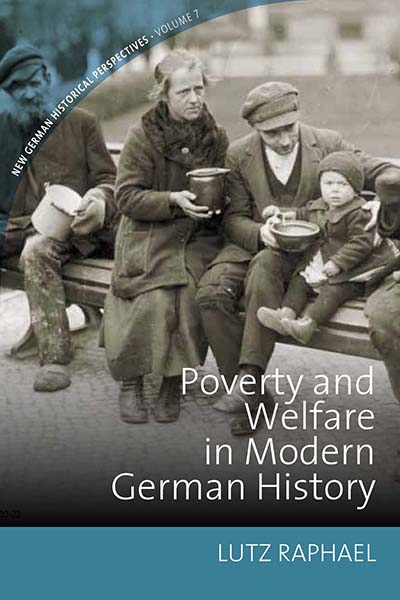 Volume 7
Volume 7
POVERTY AND WELFARE IN MODERN GERMAN HISTORY
Edited by Lutz Raphael
For many, the history of German social policy is defined primarily by that nation’s postwar emergence as a model of the European welfare state. As this comprehensive volume demonstrates, however, the question of how to care for the poor has had significant implications for German history throughout the modern era. Here, eight leading historians provide essential case studies and syntheses of current research into German welfare, from the Holy Roman Empire to the present day. Along the way, they trace the parallel historical dynamics that have continued to shape German society, including religious diversity, political exclusion and inclusion, and concepts of race and gender.
Spektrum: Publications of the German Studies Association Series
Published under the auspices of the German Studies Association, Spektrum offers current perspectives on culture, society, and political life in the German-speaking lands of central Europe—Austria, Switzerland, and the Federal Republic—from the late Middle Ages to the present day. Its titles and themes reflect the composition of the GSA and the work of its members within and across the disciplines to which they belong—literary criticism, history, cultural studies, political science, and anthropology.
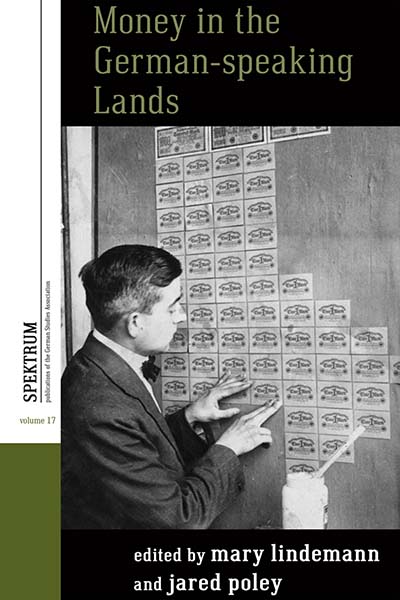 Volume 17
Volume 17
MONEY IN THE GERMAN-SPEAKING LANDS
Edited by Mary Lindemann and Jared Poley
Afterword by Michael J. Sauter
Money is more than just a medium of financial exchange: across time and place, it has performed all sorts of cultural, political, and social functions. This volume traces money in German-speaking Europe from the late Renaissance until the close of the twentieth century, exploring how people have used it and endowed it with multiple meanings. The fascinating studies gathered here collectively demonstrate money’s vast symbolic and practical significance, from its place in debates about religion and the natural world to its central role in statecraft and the formation of national identity.
Read Introduction
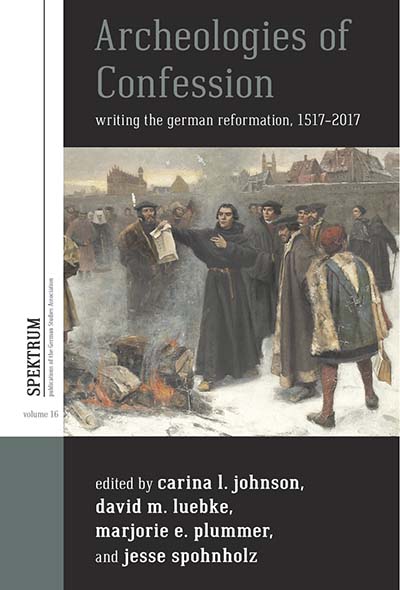 Volume 16
Volume 16
ARCHEOLOGIES OF CONFESSION
Writing the German Reformation, 1517-2017
Edited by Carina L. Johnson, David M. Luebke, Marjorie E. Plummer, and Jesse Spohnholz
Modern religious identities are rooted in collective memories that are constantly made and remade across generations. How do these mutations of memory distort our picture of historical change and the ways that historical actors perceive it? Can one give voice to those whom history has forgotten? The essays collected here examine the formation of religious identities during the Reformation in Germany through case studies of remembering and forgetting—instances in which patterns and practices of religious plurality were excised from historical memory. By tracing their ramifications through the centuries, Archeologies of Confession carefully reconstructs the often surprising histories of plurality that have otherwise been lost or obscured.
Read Introduction: Reformations Lost and Found
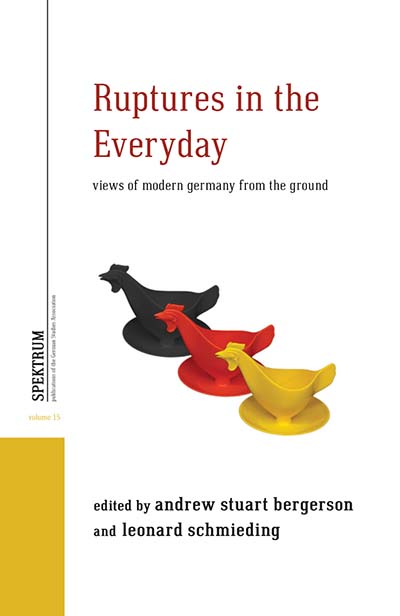 Volume 15
Volume 15
RUPTURES IN THE EVERYDAY
Views of Modern Germany from the Ground
Lead Authors: Andrew Stuart Bergerson and Leonard Schmieding
During the twentieth century, Germans experienced a long series of major and often violent disruptions in their everyday lives. Such chronic instability and precipitous change made it difficult for them to make sense of their lives as coherent stories—and for scholars to reconstruct them in retrospect. Ruptures in the Everyday brings together an international team of twenty-six researchers from across German studies to craft such a narrative. This collectively authored work of integrative scholarship investigates Alltag through the lens of fragmentary anecdotes from everyday life in modern Germany. Across ten intellectually adventurous chapters, this book explores the self, society, families, objects, institutions, policies, violence, and authority in modern Germany neither from a top-down nor bottom-up perspective, but focused squarely on everyday dynamics at work “on the ground.”
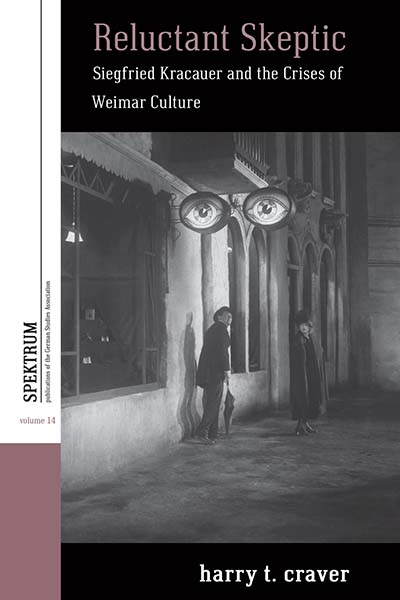 Volume 14
Volume 14
RELUCTANT SKEPTIC
Siegfried Kracauer and the Crises of Weimar Culture
Harry T. Craver
The journalist and critic Siegfried Kracauer is best remembered today for his investigations of film and other popular media, and for his seminal influence on Frankfurt School thinkers like Theodor Adorno. Less well known is his earlier work, which offered a seismographic reading of cultural fault lines in Weimar-era Germany, with an eye to the confrontation between religious revival and secular modernity. In this discerning study, historian Harry T. Craver reconstructs and richly contextualizes Kracauer’s early output, showing how he embodied the contradictions of modernity and identified the quasi-theological impulses underlying the cultural ferment of the 1920s.
Read Introduction: Kracauer on and in Weimar Modernity
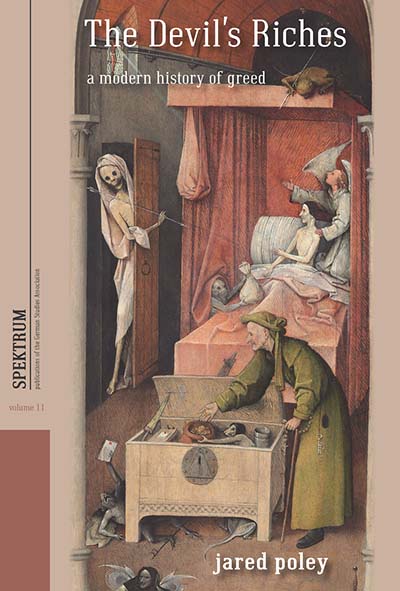 Volume 11 New in Paperback
Volume 11 New in Paperback
THE DEVIL’S RICHES
A Modern History of Greed
Jared Poley
“…a thought-provoking study of a subject that is too often taken for granted, rather than subjected to critical examination.” · Financial Times
A seeming constant in the history of capitalism, greed has nonetheless undergone considerable transformations over the last five hundred years. This multilayered account offers a fresh take on an old topic, arguing that greed was experienced as a moral phenomenon and deployed to make sense of an unjust world. Focusing specifically on the interrelated themes of religion, economics, and health—each of which sought to study and channel the power of financial desire—Jared Poley shows how evolving ideas about greed became formative elements of the modern experience.
Read Introduction
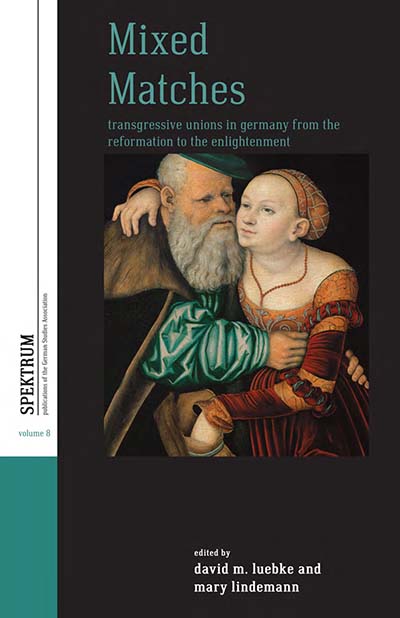 Volume 8 New in Paperback
Volume 8 New in Paperback
MIXED MATCHES
Transgressive Unions in Germany from the Reformation to the Enlightenment
Edited by David M. Luebke and Mary Lindemann
Afterword by Joel Harrington
“A seminal anthology of original work and research, Mixed Matches is a valued and highly recommended addition to personal and academic library Germany History & Culture reference collections and supplemental studies reading lists.” · Midwest Book Review
The significant changes in early modern German marriage practices included many unions that violated some taboo. That taboo could be theological and involve the marriage of monks and nuns, or refer to social misalliances as when commoners and princes (or princesses) wed. Equally transgressive were unions that crossed religious boundaries, such as marriages between Catholics and Protestants, those that violated ethnic or racial barriers, and those that broke kin-related rules. Taking as a point of departure Martin Luther’s redefinition of marriage, the contributors to this volume spin out the multiple ways that the Reformers’ attempts to simplify and clarify marriage affected education, philosophy, literature, high politics, diplomacy, and law. Ranging from the Reformation, through the ages of confessionalization, to the Enlightenment, Mixed Matches addresses the historical complexity of the socio-cultural institution of marriage.
Read Introduction: Transgressive Unions
New in Paperback:
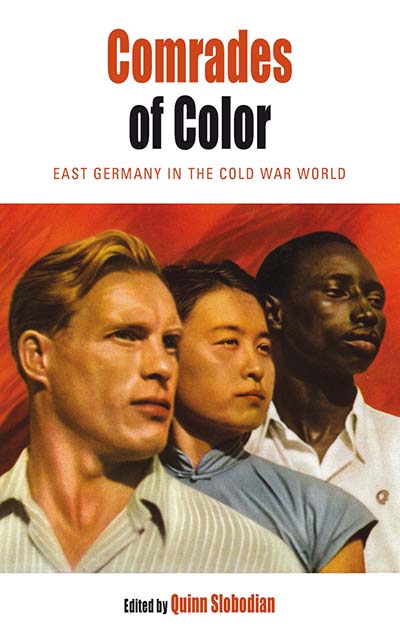 COMRADES OF COLOR
COMRADES OF COLOR
East Germany in the Cold War World
Edited by Quinn Slobodian
Volume 15, Protest, Culture & Society
“The chapters in the edited volume provide nuanced cases of East German idealism and the limitations of its practice, which belied a variety of racial prejudices and tensions… the interdisciplinary and extended geographic scope of this edited volume successfully furthers a number of interrelated fields relating to the role of the GDR and the socialist world in the Cold War, race and their continuing legacies.” · Journal of Contemporary History
Read Introduction
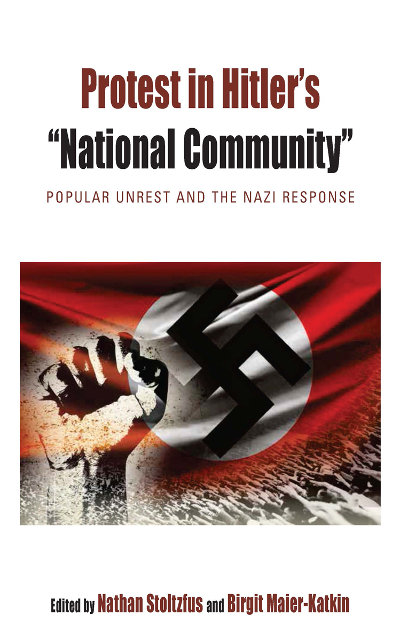 PROTEST IN HITLER’S “NATIONAL COMMUNITY”
PROTEST IN HITLER’S “NATIONAL COMMUNITY”
Popular Unrest and the Nazi Response
Edited by Nathan Stoltzfus and Birgit Maier-Katkin
Afterword by David Clay Large
Volume 14, Protest, Culture & Society
“This is a solid book and a welcome addition to the literature. It should find a place on the reading lists of any course dealing with dictatorships, totalitarianism, or twentieth-century German history.” · HISTORY: Reviews of New Books
“Protest in Hitler’s National Community: Popular Unrest and the Nazi Response is comprised of nine erudite and instructive articles that are impressively written works of seminal scholarship… [It] is strongly recommended for academic library 20th-Century German History reference collections in general, and Nazi History supplemental studies reading lists in particular.” · Midwest Book Review
Read Introduction: Nazi Responses to Popular Protest in the Reich
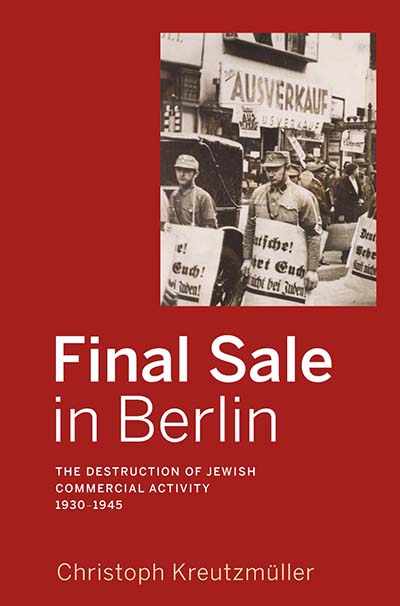 FINAL SALE IN BERLIN
FINAL SALE IN BERLIN
The Destruction of Jewish Commercial Activity, 1930-1945
Christoph Kreutzmüller
Translated from the German by Jane Paulick and Jefferson Chase
“Kreutzmüller’s well written study deals with resistance offered by Berlin’s Jews in the face of Hitler’s legal machinery to destroy their economic selfreliance. The exhaustive research… abundant examples and case studies complement the data, making the book useful for both research and teaching.” · Choice
“Christoph Kreutzmüller’s book is vigorously researched, elegantly structured and well-written, and succeeds in providing new information on a subject already exhaustively studied, namely ‘Aryanization’ and the destruction of business, that extends beyond the borders of Berlin.” · H-Net
Read Introduction
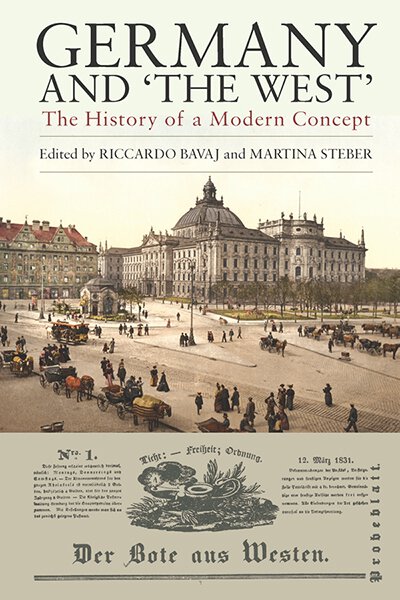 GERMANY AND ‘THE WEST’
GERMANY AND ‘THE WEST’
The History of a Modern Concept
Edited by Riccardo Bavaj and Martina Steber
“The editors of this volume deserve praise for the fine balance they found between thematic breadth and focus, and the authors for the exceptional quality of the individual chapters. A volume of this size cannot claim comprehensiveness. But it is this book’s great accomplishment to provide a rich picture of the complexity and ever changing nature of German perceptions of ‘the West.’ Whoever engages with this field is well advised to start with this insightful volume.” · H-Soz-Kult
Read Introduction: Germany and ‘the West’: The Vagaries of a Modern Relationship
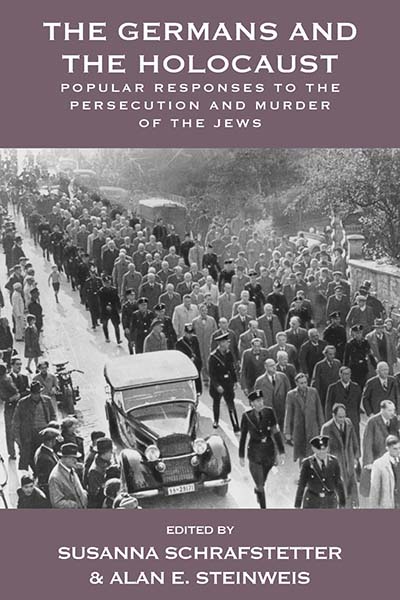 THE GERMANS AND THE HOLOCAUST
THE GERMANS AND THE HOLOCAUST
Popular Responses to the Persecution and Murder of the Jews
Edited by Susanna Schrafstetter and Alan E. Steinweis
Volume 6, Vermont Studies on Nazi Germany and the Holocaust
For decades, historians have debated how and to what extent the Holocaust penetrated the German national consciousness between 1933 and 1945. How much did “ordinary” Germans know about the subjugation and mass murder of the Jews, when did they know it, and how did they respond collectively and as individuals? This compact volume brings together six historical investigations into the subject from leading scholars employing newly accessible and previously underexploited evidence. Ranging from the roots of popular anti-Semitism to the complex motivations of Germans who hid Jews, these studies illuminate some of the most difficult questions in Holocaust historiography, supplemented with an array of fascinating primary source materials.
Read Introduction: The German People and the Holocaust
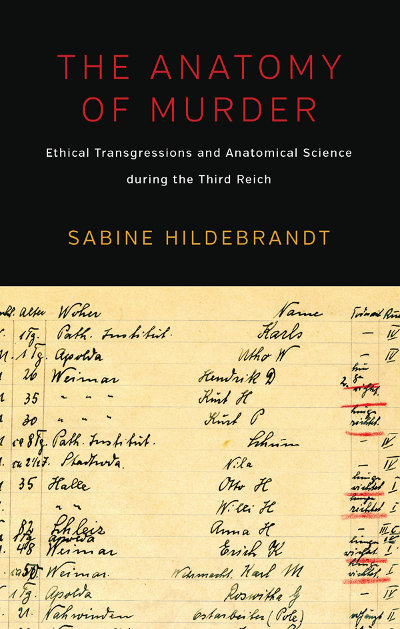 THE ANATOMY OF MURDER
THE ANATOMY OF MURDER
Ethical Transgressions and Anatomical Science during the Third Reich
Sabine Hildebrandt
Foreword by William E. Seidelman
“Based on her research in archives in Europe and North America, Hildebrandt offers a learned and well-rounded account of the manifold facets of the field, including a discussion of the ethical transgressions of coerced human-subject research, the killing of concentration camp prisoners and inmates of mental asylums, and the compilation, uses, and application of knowledge within the most inhumane contexts… an important and eye-opening book that will become standard literature for Holocaust studies programs, as well as for courses on medical ethics and the history of medicine and science during the twentieth century.” · Central European History
Read Introduction
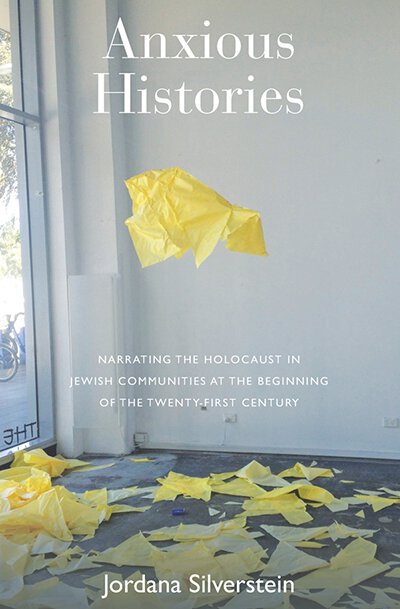 ANXIOUS HISTORIES
ANXIOUS HISTORIES
Narrating the Holocaust in Jewish Communities at the Beginning of the Twenty-First Century
Jordana Silverstein
“Anxious Histories invites scholars and educators to consider Holocaust education from a series of thought-provoking dimensions. It ought to spur further research to enrich the knowledge base at both the theoretical and practical levels. The book adds to our understanding of the contents and discontents of Holocaust education in Jewish high schools in diaspora contexts at the beginning of the 21st century. Its treatment of a crucial and timely topic in our field renders it a valuable work. For its innovative claims about the roles of both anxiety and assimilation in how Jewish educators teach the Holocaust, it merits our careful attention.” · Journal of Jewish Education
Read Introduction: Holocaust Historiography, Anxiety and the Formulations of a Diasporic Jewishness
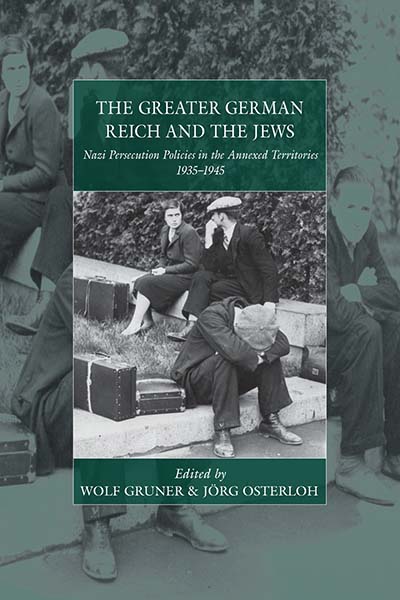 THE GREATER GERMAN REICH AND THE JEWS
THE GREATER GERMAN REICH AND THE JEWS
Nazi Persecution Policies in the Annexed Territories 1935-1945
Edited by Wolf Gruner and Jörg Osterloh
Volume 20, War and Genocide
“[This volume] is somewhat more than the usual edited collection of essays. The authors were requested to structure their contributions to a strict pattern, with each chapter organized into three sections: preannexation history; the initial German occupation; and the integration of the territories into the Reich. Each has a useful map…This systematic approach ensures clarity and allows useful comparisons.” · Journal of Modern History
“Much remains to be learned about the Holocaust in the occupied regions, but this collection helps fill the gap.” · Holocaust and Genocide Studies
Read Introduction
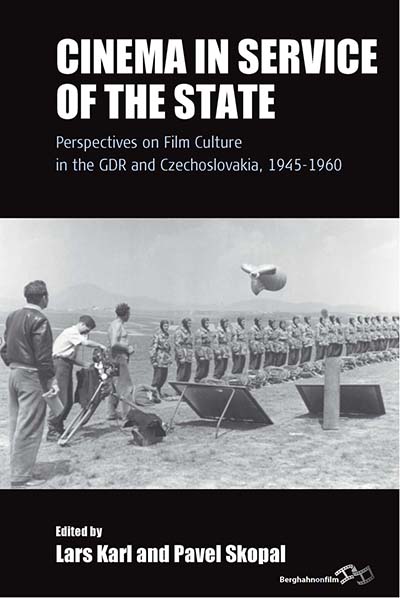 CINEMA IN SERVICE OF THE STATE
CINEMA IN SERVICE OF THE STATE
Perspectives on Film Culture in the GDR and Czechoslovakia, 1945-1960
Edited by Lars Karl and Pavel Skopal
Volume 18, Film Europa
“Given the signal role that “the most important of the arts” (as Lenin called cinema) plays in modern society, the book’s intellectual appeal transcends the disciplinary confines of “film studies,” offering a wealth of insights into the communist experiment with a classless society.” · Choice
“Lars Karl and Pavel Skopal have produced an intriguing edited volume that addresses a significant lacuna in transnational cinema scholarship.” · Historical Journal of Film, Radio and Television
Read Introduction
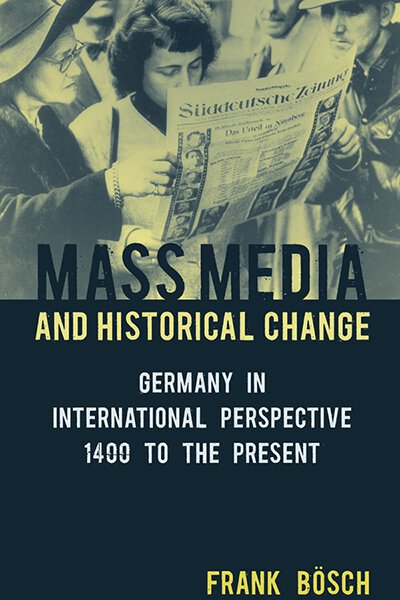 MASS MEDIA AND HISTORICAL CHANGE
MASS MEDIA AND HISTORICAL CHANGE
Germany in International Perspective, 1400 to the Present
Frank Bösch
Translated from the German by Freya Buechter
“…readers will appreciate Bosch’s insights in comparing Nazi and GDR media, and underscoring common government interventions that emerged across fascist and democratic regimes, as well as his attempts to be inclusive with regard to Asian, African, and Latin America media formations. While the Internet age appears only in an epilogue, readers will profit from Bösch’s framing and breadth, and from his comprehensive bibliography and reviews of German sources and issues.” · Choice
Read Introduction: Approaches to Media History
Of Related Interest from Berghahn Journals:
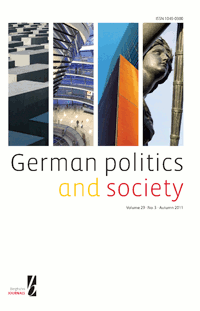
German Politics and Society is a peer-reviewed journal published and distributed by Berghahn Journals. It is the only American publication that explores issues in modern Germany from the combined perspectives of the social sciences, history, and cultural studies.

Aspasia
The International Yearbook of Central, Eastern, and Southeastern European Women’s and Gender History
Aspasia is the international peer-reviewed annual of women’s and gender history of Central, Eastern, and Southeastern Europe (CESEE). It aims to transform European women’s and gender history by expanding comparative research on women and gender to all parts of Europe, creating a European history of women and gender that encompasses more than the traditional Western European perspective.
 Contributions to the History of Concepts
Contributions to the History of Concepts
The journal serves as a platform for theoretical and methodological articles as well as empirical studies on the history of concepts and their social, political, and cultural contexts. It aims to promote the dialogue between the history of concepts and other disciplines, such as intellectual history, history of knowledge and science, linguistics, translation studies, history of political thought and discourse analysis.
Featured Article:
A Specter Is Haunting Germany-the French Specter of Milieu: On the Nomadicity and Nationality of Cultural Vocabularies
Wolf Feuerhahn
Published in association with the Leo Baeck College and the Michael Goulston Education Foundation.
For over 40 years, European Judaism has provided a voice for the postwar Jewish world in Europe. It has reflected the different realities of each country and helped to rebuild Jewish consciousness after the Holocaust.
Featured Article:
A Totem and a Taboo: Germans and Jews Re-enacting Aspects of the Holocaust
Jeremy Schonfield

Historical Reflections/Réflexions Historiques
Historical Reflections/Réflexions Historiques (HRRH) has established a well-deserved reputation for publishing high quality articles of wide-ranging interest for over forty years. The journal, which publishes articles in both English and French, is committed to exploring history in an interdisciplinary framework and with a comparative focus. Historical approaches to art, literature, and the social sciences; the history of mentalities and intellectual movements; the terrain where religion and history meet: these are the subjects to which HRRH is devoted.
Featured Article:
Envisaging Eternity: Salian Women’s Religious Patronage
Nina Verbanaz
 Journal of Educational Media, Memory, and Society
Journal of Educational Media, Memory, and Society
The Journal of Educational Media, Memory, and Society explores perceptions of society as constituted and conveyed in processes of learning and educational media. The focus is on various types of texts (such as textbooks, museums, memorials, films) and their institutional, political, social, economic, and cultural contexts.
Featured Article:
Spatial Relations and the Struggle for Space: Friedrich Ratzel’s Impact on German Education from the Wilhelmine Empire to the Third Reich
Troy Paddock

